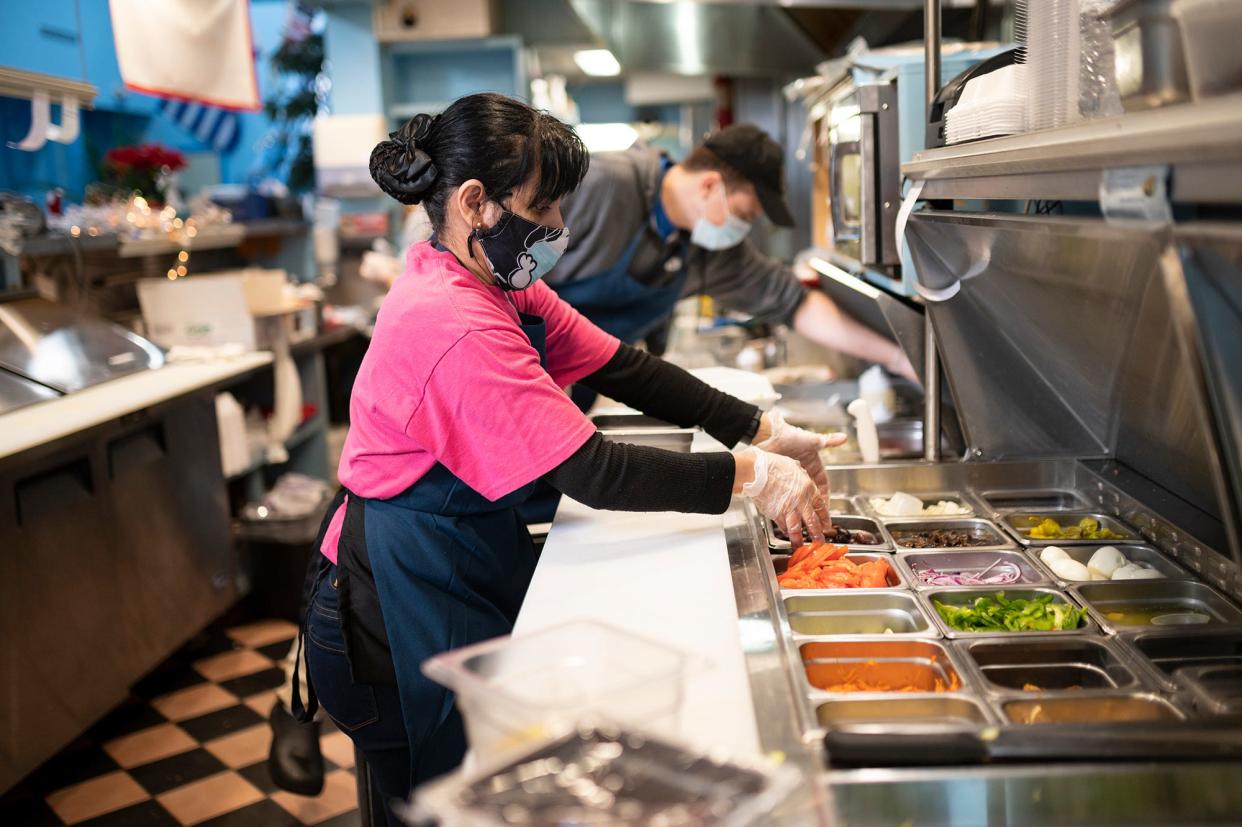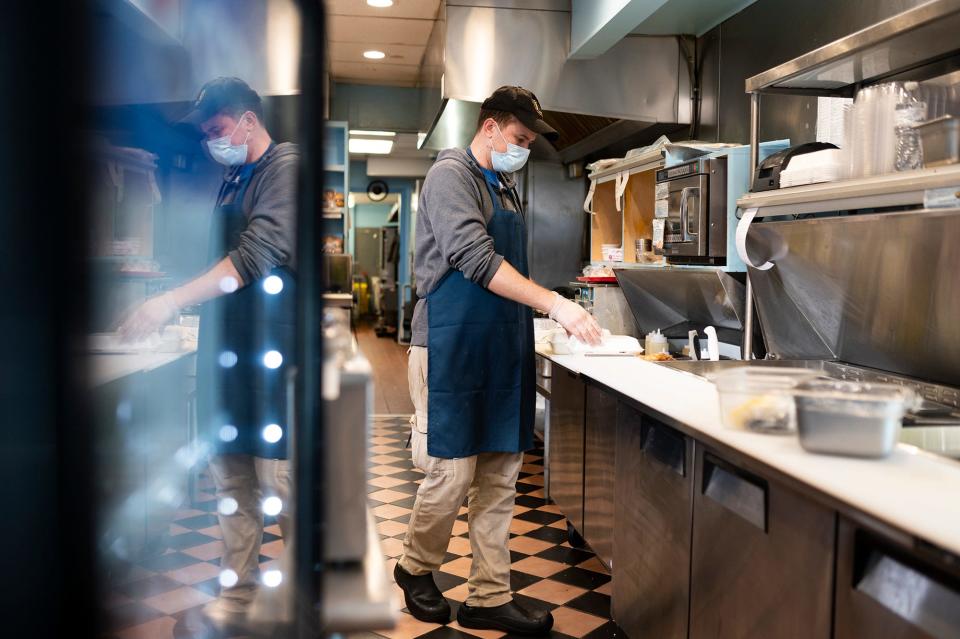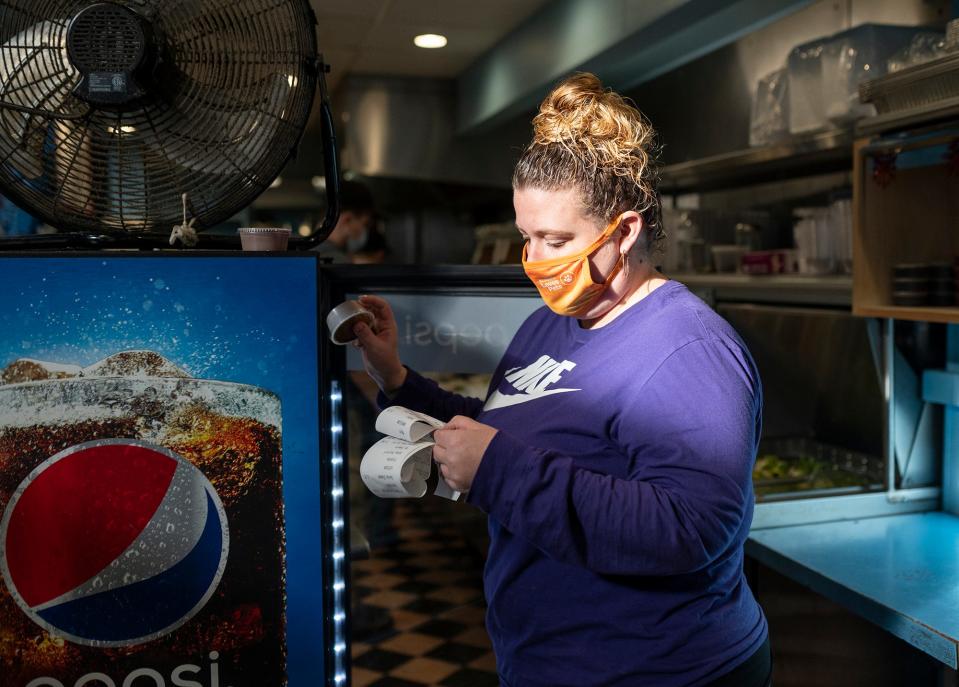Businesses worry minimum wage increase coming at the wrong time

Spoodles Deli in Worcester had a hard 2020 due to the COVID-19 pandemic, and owner Georges Makhlouf worries the state’s annual minimum wage increase could bring extra costs at the worst time for his business.
The first day of the new year will see the state minimum wage increase to $13.50 an hour and $5.55 an hour for tipped workers. The hike is an additional cost to businesses following a difficult financial year brought on by the COVID-19 pandemic and ensuing restrictions.
Makhlouf said his business is struggling to stay open after a large drop in profits. While he would welcome the wage hike in a better time, Makhlouf said it brings additional costs when sales are already at a low point.
“Increasing the minimum wage is good, but it’s a bad time right now because our business is down,” Makhlouf said, “It’s very hard to keep it open and I’ve been borrowing money left and right. The cost of operation is still the same and there’s no income.”
Makhlouf is also concerned that the increase to the minimum wage could lead to businesses such as his letting employees go.

“You’re going to have a problem between the employees and the businesses,” Makhlouf said, “Whether you fire people or give them less hours. It’s going to be tough.”
Many small businesses like Makhlouf’s across the nation have fought to avoid bankruptcy during the pandemic. While they may have been preparing for the wage hike at the start of the year, a global pandemic did not factor into most of their thinking.
Alex Guardiola, director of government affairs and public policy at the Worcester Regional Chamber of Commerce, said the pandemic has thrown a wrench in the financial expectations for small businesses.
“A lot of business owners have been preparing for the increase in wages,” Guardiola said. “I don’t think anybody anticipated the onslaught of other costs that would be added to the original tally of what businesses would have to come up with.”
Businesses have had to devise strategic ways to use their funds to deal with increased expenses of ordering personal protective equipment while also facing closures of in-person service or capacity restrictions and curfews throughout the year, Guardiola said. The minimum wage will play into the math on how many employees businesses may need to lay off next year to stay afloat.

The wage hike will be the latest in a series of yearly increments to raise the state’s minimum wage to $15 an hour by 2023 and to $6.75 for tipped workers. The hikes were signed into law as part of 2018’s “Grand Bargain” legislation. The minimum wage has already increased from $11 an hour in 2018 to $12 an hour in 2019 and 12.75 an hour at the start of 2020. The tipped minimum wage was initially $3.75 an hour in 2018 and increased to $4.35 an hour in 2019 and $4.95 an hour at the start of 2020.
Some believe that the minimum wage hike provides necessary income to workers and will boost spending for small businesses, while opponents of the minimum wage increase fear the extra costs could help to permanently close small businesses.
Christopher Carlozzi, state director of the National Federation of Independent Business in Massachusetts, said that raising the minimum wage adds costs that could close small businesses, lead to cuts in jobs and hours for employees and raise the price of goods for customers. The increased economic hardship brought about by the pandemic only worsens the issue, Carlozzi said.
“A quarter of small businesses are already facing whether or not their doors might be closed permanently if these economic conditions continue,” Carlozzi said, “To add labor cost increases in the middle of a pandemic when businesses are struggling is very problematic and something that a lot of small employers are looking at right now.”
The wage hike also does not exist in a vacuum, Carlozzi said. Additional costs from a paid family leave benefit going into effect, a 60% increase in unemployment insurance taxes and a possible raise in health insurance premiums could further burden Massachusetts small businesses at the same time as the minimum wage increases, Carlozzi said. Businesses are also facing a capacity restriction to 25%. The restaurant, retail and hospitality industries are among the industries that were most affected by the pandemic and are especially at risk with a wage hike, Carlozzi said.
Advocates of the minimum wage increase believe that the wage hike is a net positive for city economies and the state’s economy. They believe workers will have more spending power that can help area businesses absorb costs. Hans Despain, professor of economics and chair of the economics program at Nichols College, said that the hike should be beneficial as long as new spending makes up for losses in investment. In cities with higher inequality, a wage hike should be especially useful in creating new spending, Despain said.
Phineas Baxandall, senior analyst for the Massachusetts Budget and Policy Center, agreed that the hike gives workers more money to spend on local businesses. He said that consumers being less pinched for cash will be helpful in recovery for small businesses.
“Hundreds and thousands of workers across the state are going to have more money in their pocket” Baxandall said, “They will be able to spend those dollars quickly and within the community. This will provide additional stimulus as customers to local businesses.”
When the previous minimum wage hike went into effect the Massachusetts Budget and Policy Center released data saying that more than 420,000 Massachusetts workers would see an increase in revenue generating $410 million. The data said that 44% of workers aged 16 to 24, 45% of food service workers and 61% of tipped workers would benefit from the hike.
However, Despain said certain small businesses may benefit more from a wage hike than others. While he said businesses that cater to less wealthy clients such as delis can benefit from increased consumer spending, Despain said businesses that cater to wealthier clients like a high-end restaurant could receive less of a boost in customer spending. Businesses such as roofers where the need for services is more limited could also suffer from a wage increase, Despain said.
“An owner of a roofing company contacted me in an email several years ago and said (a hike in the minimum wage) increases my cost but it’s very unlikely that I’m going to get an increase in the number of roofs,” Despain said.
Despain said the pandemic and the loss of countless small businesses has only made the need for a wage hike more urgent for the state as more residents start working for chain and medium-sized businesses. While startup small businesses looking to launch during or after the pandemic may be worried about the additional cost of the minimum wage, Despain said he believes proprietors will hear good news about increased consumer spending and decide to go forward with their business plans.
***********
This article originally appeared on Telegram & Gazette: Businesses worry minimum wage increase coming at a bad time

